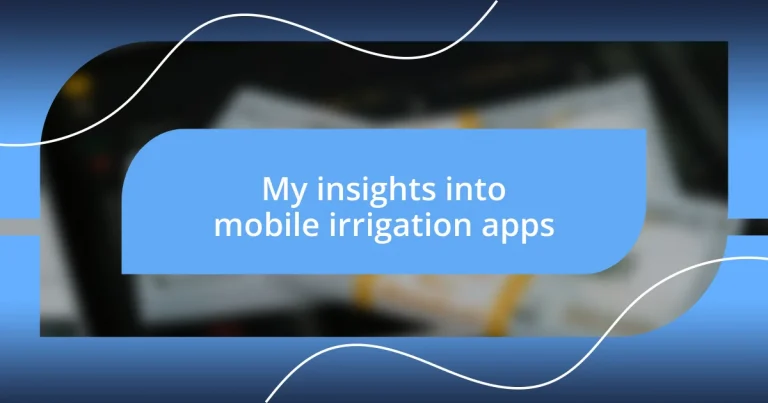Key takeaways:
- Mobile irrigation apps utilize real-time data and adaptive scheduling to optimize water usage and improve plant health, addressing challenges posed by changing weather conditions.
- Key features of these apps include real-time monitoring, adaptive scheduling, and integration with smart irrigation systems, enhancing user convenience and water management.
- Future trends in irrigation technology are focused on AI integration, sustainable practices, and remote sensing technologies, promising to increase efficiency and support eco-friendly farming methods.
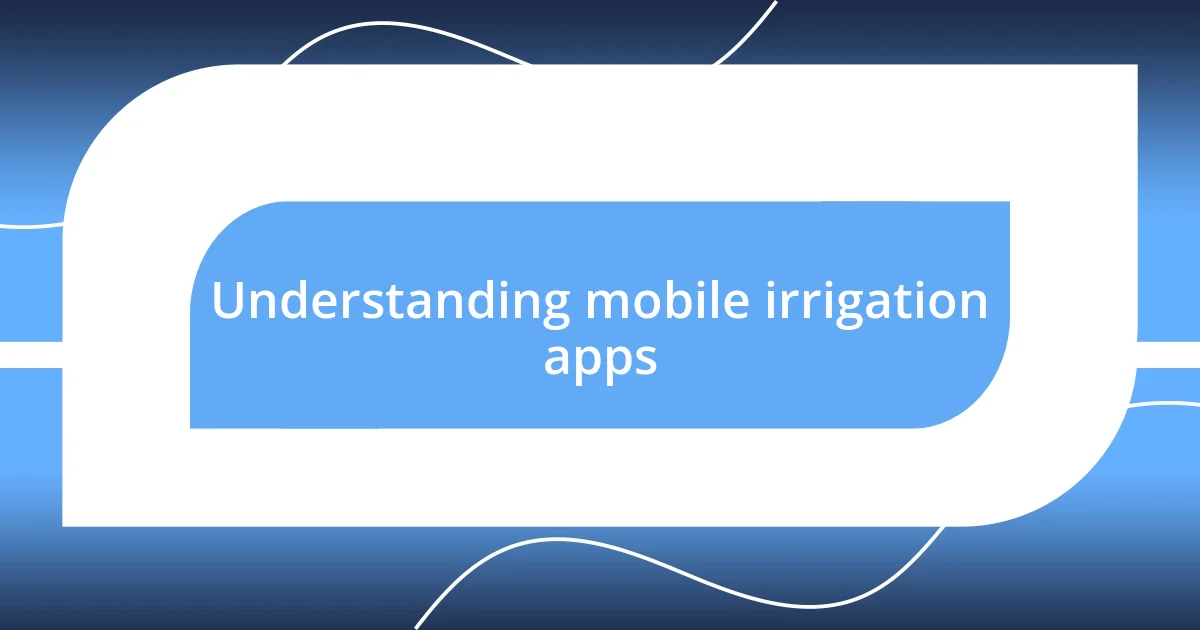
Understanding mobile irrigation apps
Mobile irrigation apps represent a significant leap forward in agricultural technology. From my experience, they simplify the complex task of watering crops by providing real-time data and tailored irrigation schedules. Have you ever wondered how farmers manage to optimize water usage amidst changing weather patterns? These apps answer that question by using advanced analytics to help users make informed decisions.
I recall a time when I was experimenting with my own garden, unsure of how much water to allocate. When I started using a mobile irrigation app, it felt like having a knowledgeable advisor in my pocket. The app’s ability to analyze soil moisture levels made me realize I was over-watering, which not only saved me water but also significantly improved my plant health.
What’s fascinating is how these apps go beyond just irrigation. They often include features for weather forecasting and soil health monitoring. I remember scrolling through an app, intrigued by its predictions for rain; it encouraged me to adjust my irrigation plans accordingly. Who knew our smartphones could play such a pivotal role in sustainable farming practices?
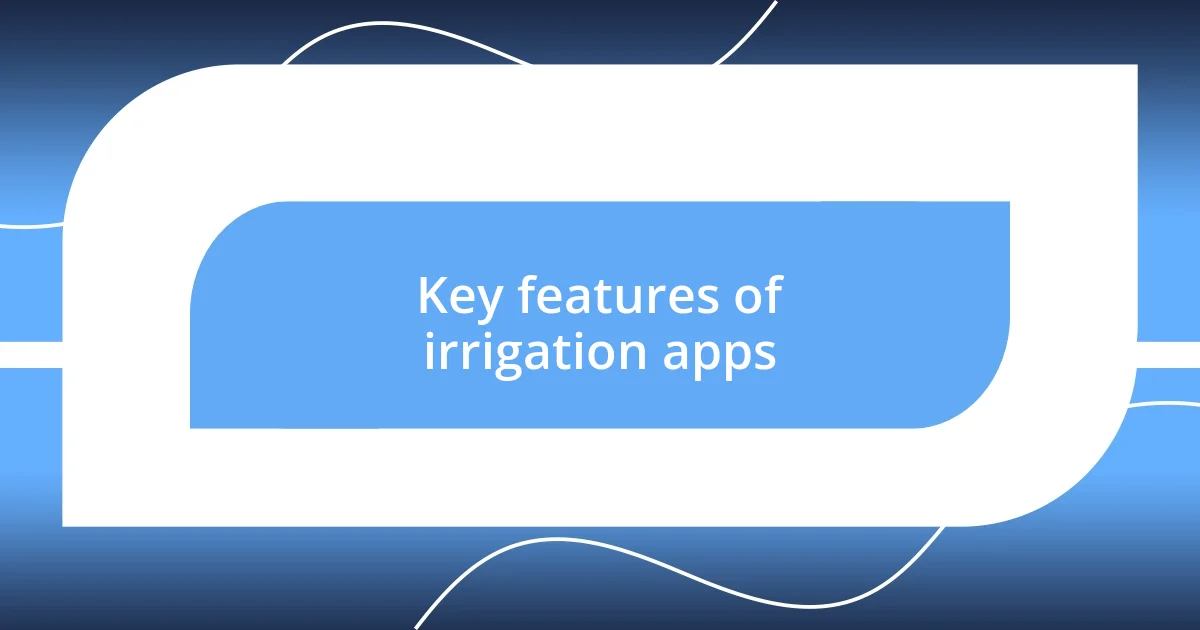
Key features of irrigation apps
Mobile irrigation apps are equipped with an array of features that cater to both small-scale gardeners and large-scale farmers. One of the standout features is real-time monitoring. I still remember the thrill of checking the moisture levels from my smartphone while lounging on the couch. Having instant access to this information transformed my gardening routine, allowing me to respond to changes quickly without ever stepping outside.
Another crucial aspect of these apps is their adaptive scheduling. Many apps use predictive analytics to create customized irrigation schedules based on your specific crops and local weather conditions. It’s like having a personal assistant that understands not just my plants, but also the environment they’re growing in. Last summer, there were days I would have forgotten to water during a heatwave, but my app sent me a friendly reminder, ensuring my garden thrived even in challenging conditions.
Additionally, integration with smart irrigation systems is becoming increasingly common. This seamless connectivity allows for automated adjustments of irrigation based on real-time weather updates. Imagine the peace of mind knowing that your irrigation system is working while you focus on other priorities. It’s an empowering experience—one where technology and nature come together harmoniously.
| Feature | Description |
|---|---|
| Real-time Monitoring | Access immediate data on soil moisture levels and environmental conditions. |
| Adaptive Scheduling | Create customized irrigation schedules based on crops and weather conditions. |
| Smart System Integration | Connect with automated watering systems for seamless adjustments. |
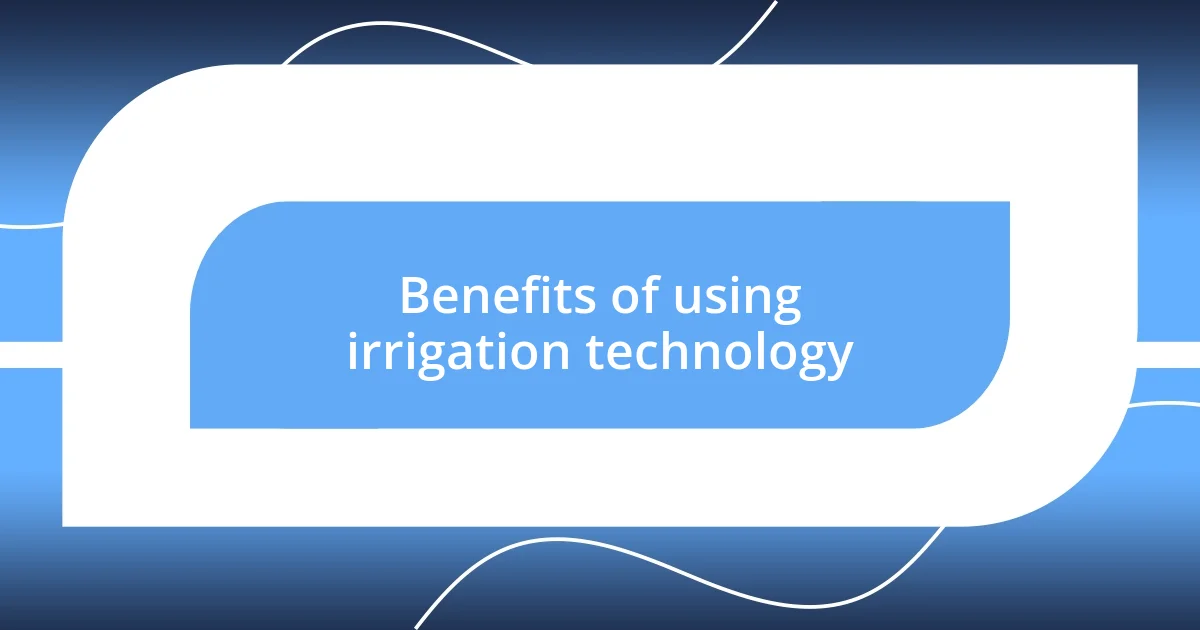
Benefits of using irrigation technology
The advantages of using irrigation technology are manifold, especially when considering how efficiently it can manage water resources. From my perspective, one significant benefit is the reduction in water waste. I remember a time when I was frustrated by the unpredictable results of my watering habits—over-watering led to wilting plants and under-watering had me constantly worrying. With an irrigation app, I’ve found that I can maintain the perfect balance by closely monitoring and adjusting my water usage.
- Water Conservation: These apps provide precise data, allowing for targeted watering, which conserves precious resources.
- Increased Crop Yields: Proper irrigation directly correlates to healthier plants, boosting both quality and quantity.
- Time Savings: Automation features allow me to spend less time worrying about watering schedules and more time enjoying my garden.
Another important aspect is the peace of mind that comes with efficiency. Using mobile irrigation technology allows me to feel less anxious about my plants, knowing I can monitor conditions remotely. I still think back to one particularly busy week when I was out of town. Instead of worrying, I was able to check in via my app and adjust my irrigation settings from across the state. It was a small but gratifying change, reinforcing how technology can transform our everyday lives.
- Remote Management: Monitor and control irrigation from anywhere, providing flexibility and convenience.
- Data-Driven Insights: These apps offer analytics, helping users make informed decisions about their practices.
- Environmental Benefits: Efficient watering practices have a positive impact on local ecosystems by preserving water and reducing runoff.
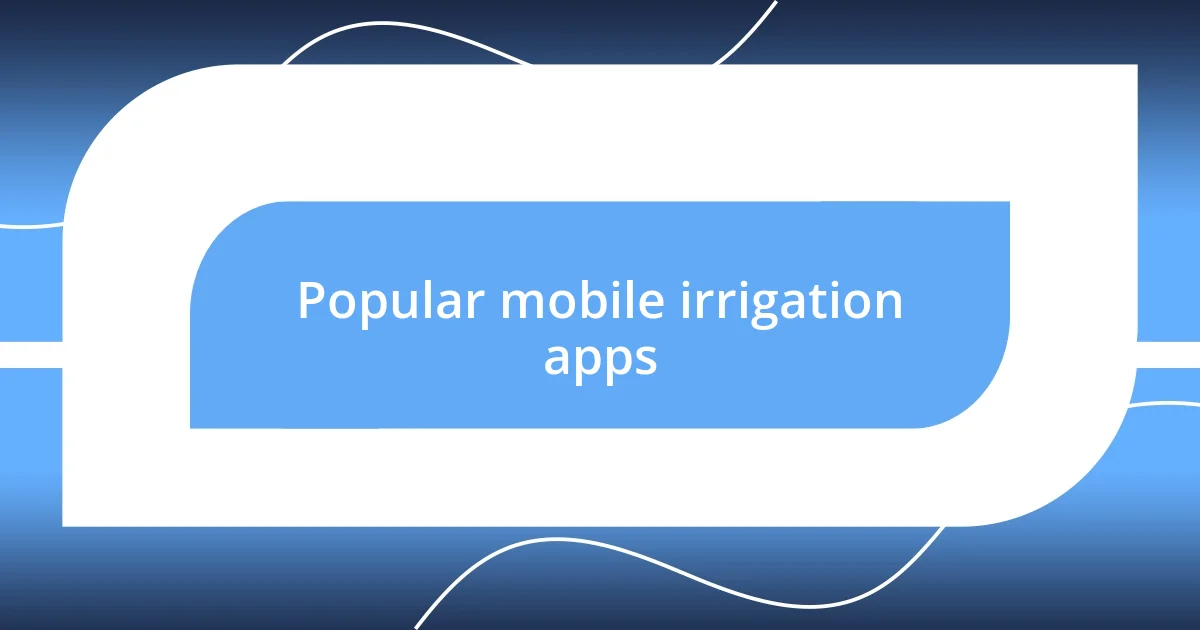
Popular mobile irrigation apps
When it comes to popular mobile irrigation apps, I can’t help but mention apps like CropX and RainMachine. These platforms have won me over with their user-friendly interfaces and robust features. For example, I recall the day I first used RainMachine. After setting it up, I was astonished by how it adjusted my watering schedule based on local weather forecasts. It’s that level of adaptability that truly underscores the power of technology in agriculture.
Another app that stands out is AquaSpy, particularly for its soil moisture sensors. I had the chance to test this app during a particularly dry spell, and I was impressed by how much more informed I felt about my watering strategy. By visualizing the moisture levels in my soil, I made data-driven decisions that not only saved water but also kept my plants happy and healthy. Isn’t it fascinating how a little data can lead to such significant improvements?
Lastly, FarmLogs deserves a spot on this list. This app allows users to keep track of various aspects of their farming or gardening journey, from rainfall amounts to crop health. I remember logging my first season with FarmLogs and seeing my progress mapped out. It was inspiring to watch the numbers turn into tangible results, encouraging me to try new techniques. It may seem like a small tool, but the insights it offers can motivate even the most casual gardener to explore their full potential.
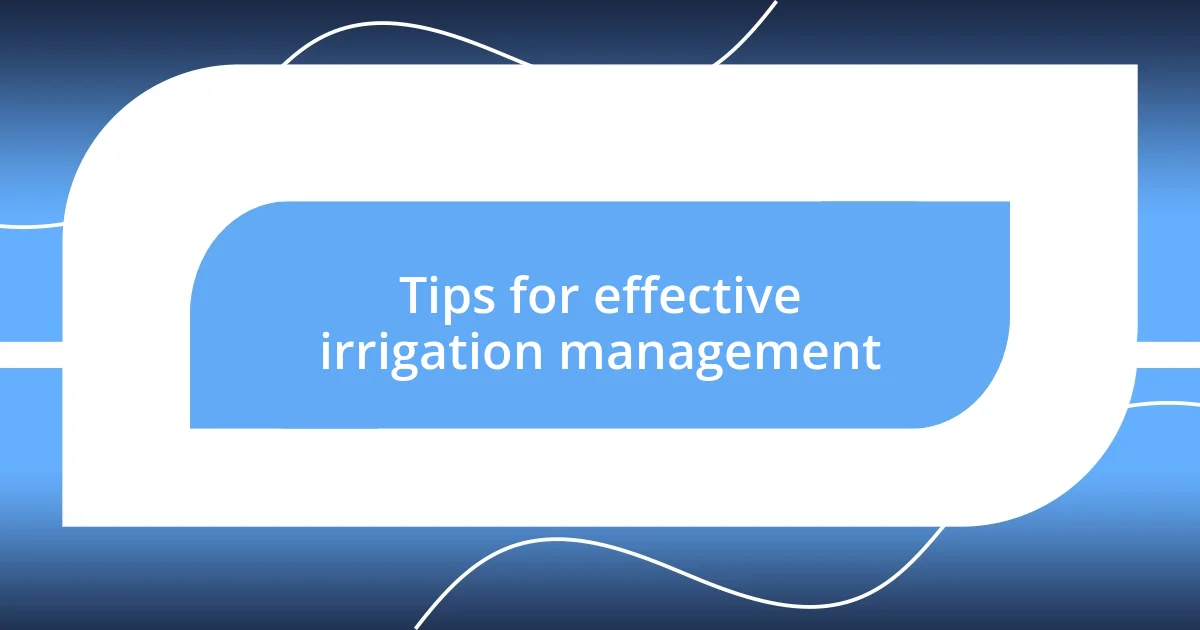
Tips for effective irrigation management
One of the most effective tips for irrigation management is to establish a schedule based on your plants’ specific needs and local weather conditions. I recall a time when I stubbornly watered my garden at the same intervals, regardless of the sun’s intensity or rain accumulation. After realizing the negative impact on my plants, I started utilizing an app to adjust my watering times, and the difference was astonishing. Targeted watering can prevent stress on your plants and conserve water, making it a win-win situation.
I’ve also found that regularly checking soil moisture levels can dramatically improve irrigation strategies. I remember digging down into my garden bed one afternoon, only to find that the surface felt dry while the soil beneath was quite damp. Those surface readings can be misleading! Now, with the help of moisture sensors linked to my irrigation app, I’m able to decide exactly when to water and how much to use. Have you ever wondered how many resources you could save by knowing the actual moisture content? Trust me; the insights are empowering.
Finally, always keep the functionality of your irrigation system in check. I learned this the hard way when I discovered a clogged nozzle one hot afternoon. My plants suffered while I slaved away trying to troubleshoot! Regular maintenance has since become a part of my routine. By ensuring that everything runs smoothly, I not only save on resources but also nurture healthier plants. Have you ever skipped maintenance only to be left with a garden that isn’t quite reaching its potential? Routine checks help keep my confidence high and my gardening thriving.
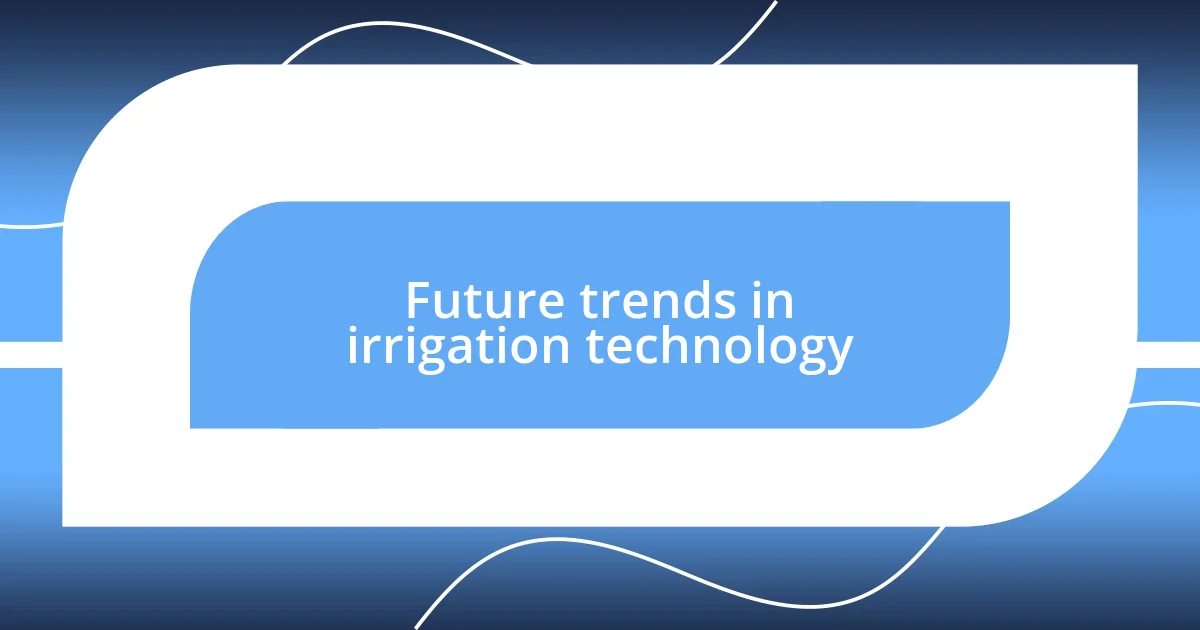
Future trends in irrigation technology
As I look ahead at the future of irrigation technology, I can’t help but be excited by the integration of artificial intelligence (AI) and machine learning. Imagine a system that not only monitors your crops in real-time but can also predict their watering needs based on historical data and weather patterns. I remember when I first heard about AI applications in the field, and I thought, “What if I could automate my watering schedule entirely?” That thought alone promises to elevate efficiency and resource management.
Moreover, I foresee a growing emphasis on sustainable practices within irrigation tech. With global water scarcity becoming a pressing issue, technologies that use recycled water or optimize rainfall collection are gaining traction. The idea of minimizing waste while maximizing crop yields resonates deeply with my values. Just a few years ago, I tried a rain barrel system, and it felt refreshing to see my plants flourish while conserving water at the same time. Doesn’t it feel fulfilling to know that you are contributing to sustainability?
Lastly, I’m intrigued by the potential of remote sensing technology. Drones equipped with advanced sensors can provide detailed insights into crop health and soil conditions. I remember watching a demonstration of drone mapping and being blown away by the level of detail it provided. What if I could fly a drone over my garden to assess its health? It feels like something out of a sci-fi movie! The notion of gaining such granular insights seems like a game changer for anyone passionate about nurturing their plants while embracing technology. Wouldn’t you agree that farming could become even more intuitive with tools like these?












